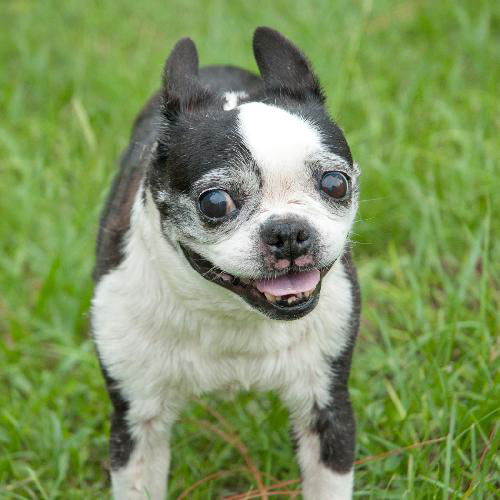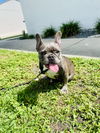
| My Rescue |
| Login to Remember your Favorite Animals and Breeds! |
Fritz came to our local vet from a high kill shelter. Poor girl had some mammary tumors and the shelter was going to put her down. Our vet volunteered to remove them if we could find a home for this sweet little senior Boston! She is so sweet and loving and although she is a senior she has plenty of energy and love to give!
Fritzey qualifies for our senior for senior program, if adopted by a senior (65 years or older) her adoption fee will be $50.
Foster Update 8.7.11: Fritzy is a precious little doggie. She's a senior citizen, but still has a lot of spunk. She doesn't pay much attention to my dog or cats.
she eats very well, dry dog food but prefers a little yogurt of canned mixed with it. She doesn't "ask" to go out, but will do her business when you take her. She wants to be in the same room with me- will follow me from room to room - but really doesn't mind the crate. At night she sleeps in her bed right by my bed and never moves all night - until I wake her the next morning. She's been on anti-biotics since her operation, and she seems to get happier and happier every day. She surely will make someone a great pet!
According to www.dogbreedinfo.com, bred down in size from pit-fighting dogs of the bull and terrier types, the Boston Terrier originally weighed up to 44 pounds (20 kg.) (Olde Boston Bulldogge). It is difficult to believe that these dapper little dogs were once tough pit-fighters. In fact, their weight classifications were once divided as lightweight, middle and heavyweight. The Boston Terrier is one of the few breeds that was "Made in the USA." Boston to be exact. The original Boston Terriers were a cross between the English Bulldog and now extinct English White Terrier. Around 1865, the coachmen employed by the wealthy people of Boston began to interbreed some of these fine dogs owned by their employers. One of these crosses, between an English White Terrier and an English Bulldog resulted in a dog named Hooper's Judge. Judge weighed over 30 pounds (13.5 kg.) he was bred down in size with a smaller female and one of those male pups was bred to yet a smaller female. Their offspring interbred with one or more French Bulldogs, providing the foundation for the Boston Terrier. By 1889 the breed had become sufficiently popular in Boston that fanciers formed the American Bull Terrier Club, but this proposed name for the breed was not well received by the Bull Terrier Fanciers. The breeds nickname, roundheads, was similarly inappropriate. Shortly after, the breed was named the Boston Terrier after its birthplace. The breed was recognized by the AKC in 1893. It was first shown in Boston in 1870. In the early years the color and markings were not very important but by the 1900's the breeds distinctive markings and color were written into the standard becoming an essential feature. Terrier only in name, the Boston Terrier has lost most of their ruthless desire for mayhem, preferring the company of humans, although "some" males will still challenge other dogs if they feel their territory is being invaded. Though bred at first for use in dog fights, today's Boston Terrier has been bred to have less aggressive tendencies. It is gentle, alert, very intelligent, and well-mannered. Enthusiastic and occasionally rambunctious, this breed has a sense of humor. They are very sensitive to the tone of one's voice. This breed likes to learn and therefore is not difficult to train. Their intelligence ensures they pick things up quickly. At times they can be somewhat willful. Some owners have reported that their dogs are good watchdogs barking only when necessary, while other owners have reported their female Boston Terriers do not bark at the door at all. Most reliable with children, especially good with elderly people and very friendly with strangers. The Boston Terrier is playful, very affectionate and likes to be part of the family. Very popular in the United States, due above all to its excellent character. They generally get along well with non-canine pets. Some males are dominant and may fight with other dogs. These little dogs may be difficult to housebreak. They have a life expectancy of 15 or more years.
Other Pictures of Fritzey the senior Boston Terrier (click to see larger version):
 25.3k |
 24k |
 26.5k |
 24.9k |
Copyright © Pet Rescue by Judy





